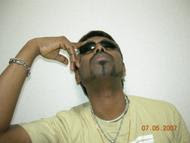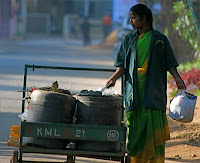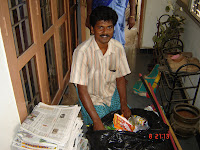Wrote this short article on India to present to a Japanese, when I visited his house. Japanese are very good Hosts and they can be a equally good guest.
BHARAT
India was under British rule until 1947. On August 15 1947, India got independence from the British. In 1950, it became a Democratic Republic and now it is the world’s largest Democratic Republic. The British came to India during 1600 for doing business under the name East Indian Company. During that period, India was considered a country with lot of rich and wealth.
British in India
The main trade between India and Europe was Spices from India, which was transported through land via Afghan, Turkey and into Europe. Due to the disturbance around Afghan like robbery and looting, the Europeans could not do proper trade. Therefore, they decided to find a sea route to India. Many European countries like Portugal, Spain, and French started their voyage in sea to find the sea route to India. The most notable sailors among them were Christopher Columbus (Portugal), Americus Vespucious (Italy) and Vasco da Gama (Portugal). In searching, the route to India Columbus reached a land and declared that he had found the sea route to India. Europeans believed that place was India. Later Americus Vespucious traveled to the same place and told that it is not India but a new land. That land became the present America named after Americus Vespucious.
Finally, on 20 May 1498 Vasco da Gama a Portugal Voyager reached India at Calicut a southern port in the west coast of India. That opened the gate for many voyages to India, the French, the Portuguese, The Dutch, The English all started to travel to India and establish their business.
That time India was not a whole country as it is now. Many small kings ruled it. The British signed Treaty and Agreements with the kings and started capturing India. Those who were not ready to sign the agreement were made war. This way the British won all the kings and became the ruler of India. The French and the Portugal too had their small rule in parts of India.
After a long struggle, India won the freedom from the British. Mahatma Gandhi led a peaceful non-violence revolution against the British to get freedom. There were also some other leaders like Subash Chandra Bose who prepared war against the British. Subash Chandra Bose sought military help from Japan to fight against the British.
Hindu
Before the British ruled, the Mughals ruled most part of India. During this time, Muslims came to India. During the British rule, Christianity came to India. The major religion in India is Hindu. There is no clear history on who formed the Hinduism? When it was formed? What exactly is Hinduism is not so easy to define. Like Bible, the Holy book of Hinduism is Bhagavad-Gita. However, not even one percent of Hindus might have read this book. Nothing is a fixed rule in Hinduism nothing is forced on anyone. Even if you do not worship God then also you remain a Hindu. There are Hindus, who are vegetarian and some eat meat, still all are Hindus.
About the race of the people, in general there are two races in India; one is the Aryan who is believed to come from Europe and other the Dravidians who belong to the southern part of India. The Dravidians are dark skinned and was believed to be worshiping nature. The Hinduism and the Gods were brought by Aryans and gradually Dravidians adopted the Aryan culture.
In earlier centuries, depending upon the person’s work, they were divided into different groups called Castes. It was that a son has to do his fathers job. Therefore, a farmer’s son was a farmer, a Priests son was a Priest, this developed into the Caste system, and people were so much divided in the community. This affected the education system, as farmer’s son has to be farmer, he never went to school. Therefore, majority of the people remained uneducated. It was only during the British rule the British Educational system was brought and many schools were opened after Independence (1947) and now most of the people are educated.
Diverse India
Before the British occupied India, India was not a single country; many kings ruled it. After Independence, it became one country but Pakistan, which was a part of India, was separated as the Muslim population was more there.
Now India has different states, these States were divided based on the language. This way there are more than 20 official languages. The National language is Hindi, which is spoken by majority of the people. In school, mostly children learn three languages, their own language, Hindi and English. The culture, food, dress and many more is different from language to language. Each language (state) has its own culture. There are only three National Holidays in India and the rest Holidays are State Holidays, because the culture is different from state to state. Though many things seem to be different there would be something common among the culture. This is famously known as Unity among Diversity of India.
Developing India
India is developing nation. It was basically an Agricultural nation. The Indian government from 1950 started industrialization and some industries started to come. The land is a very fertile land for agriculture of different kind from food, vegetables, cotton also there are lot of iron ores and some oil and gas reserves.
The industrialization was mainly brought by government, very few private industrialists were in India, and few among them were Tata and Birla. JRD Tata formed the Tata group of companies which diverisified from Iron, flight, house hold items to many to the present IT companies. There were some government own industries too, in all sectors, from Oil and gas to power. But the industrialization was not enough to employ the growing population of India. The population was 30 million during 1945 and now it crossed one Billion. While big land lords were rich, small farmers remained poor. Unemployment was increasing with population, more and more people remained in poverty.
On the other hand well educated intelligent people from top universities in India flew to developed nations like USA and worked there. Not only educated all levels of people started to travel abroad and worked in many countries like, USA, UK, Canada, Arabia, Singapore, Malaysia, Sri Lanka.
Presently there are many private industrialists and the country is developing faster. The IT revolution of the world opened employment opportunity in India. The man power was very effective and now Indian economy is booming because of its IT man power.
India has its own Space research centre and launch pad. It has proved its skill in the space research quite often launching satellites built fully in India.
Culture and Society
Indian culture is family and society based. Lot of values is given between family members. Even in the present, marriages are arranged by parents. The parents select the partner and the marriage is arranged after the boy and girl agrees. Though nowadays thing are changing due to westernization and some find their own partners. Most of the Indian festivals are based on God. The most famous one being Deepawali, this function is celebrated by all Hindus.
Indian society too is a male dominated society, but things are changing nowadays as the education levels of girls are almost equal to men.
The music and dance culture is very rich. There are many kinds of classical and folk dance and music. The most famous dance of India is Bharatanatyam, which is more famous in South India and the two famous classical forms of music are Karnatic and Hindustani. The modern India has started adopting the western culture and fusion of the Western with Indian music is very popular recently.
Cinema industry is very big and more movies are produced than in Hollywood.
Bharat and Hindustan are other names of India.






